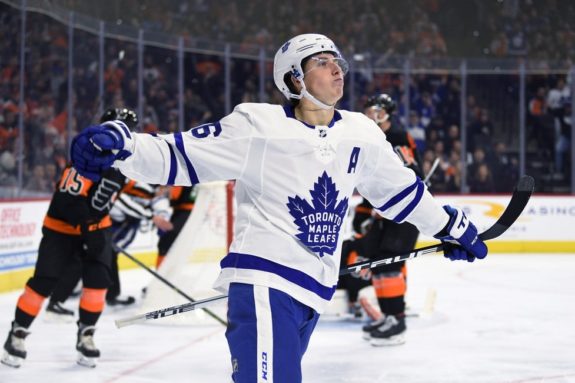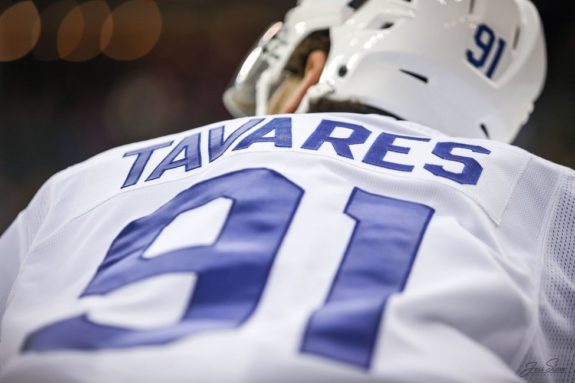How should one rate the contract values of the Toronto Maple Leafs forwards? That question has been spinning around in Maple Leafs nation for the past two weeks, and it’s an interesting one to ask and answer. General manager Kyle Dubas has a reputation of either being overly generous with players contracts; or, conversely, he’s seen as a bit of a weenie when he comes to standing up to player agents.
Related: Maple Leafs News & Rumors: Chara, Barabanov & Team Leadership
Whatever one’s assessment, there’s little argument that Dubas has signed players to high-value contracts. Furthermore, his penchant to do so has been blamed for the consistent difficulty the Maple Leafs have had dancing a limbo with the upper limits of the CBA’s imposed salary cap.
Two things seem true of Dubas. First, he has a vision for what he wants his team to look like and he’s spending big money to turn that vision into a reality. Second, he’s always figured out creative ways to keep his team under the salary cap structure, but he’s had to engage in organizational contortions to do so.
Jonas Siegel’s Assessment of Maple Leafs’ Contract Values
In an article last week, Jonas Siegel of The Athletic looked at the “value” of Maple Leafs contracts. I have to believe Siegel’s quest to review the value of the organization’s current contracts had its genesis with a quote general manager Dubas made in mailbag article written by Sportsnet’s Luke Fox exactly two weeks ago today. In that article, Fox was asked by a Maple Leafs fan to rank the best and the worst contracts on the Maple Leafs roster. (from “Rating the value of every Maple Leafs contract for next season,” Jonas Siegel, The Athletic, 24/11/20).

At the time Dubas was quoted, “We don’t really have any contracts that we look at and say, ‘We need to get rid of this player. This player isn’t delivering on it at all,’ Some may disagree — and that’s fine, and that’s fair — but we’re pretty content with our group.”
By the way, at the time Fox ranked William Nylander, Morgan Rielly, and Ilya Mikheyev’s contracts as carrying good value for the team.
Assessing the Value of the Maple Leafs’ Forwards’ Contracts
Siegel, I believe, asked that same question. Here, although I won’t share every contract Siegel assessed, I want to review and comment on what he said about the Maple Leafs forwards. Of any group, the garage where the forwards’ contracts are parked has the shiniest cars – that is, the organization’s forwards are signed to the most expensive contracts.
Related: Top 5 Goaltenders of the 1970s
Of the forwards, Siegel ranked Mitch Marner’s contract in the middle – neither of good value nor poor value. Obviously, for his second contract with the team, Marner’s contract was plenty big enough and a case can be made that he was overpaid. There seems to be an NHL tradition that young players should slide up the salary scale rather than leap up that scale. To justify his ranking of Marner, Siegel suggested Marner is a rising star “who puts up elite numbers and performs in all situations.”
Here’s how much Maple Leafs fans and hockey writers have come to expect of Marner. Last season he was seen to have a “down season.” However, the numbers show that he scored 16 goals and 51 assists for 67 points in 59 games. That kind of a point-a-game production would be seen as good value for most young player’s contracts, and we’re looking for him to have a bounce-back season this year? What would that bounce-back season look like?

The problem is that Marner is scoring those points for $10.893 million and not for $6.963 million as William Nylander is. Which is, after all, Siegel’s argument.
Assessing Other Maple Leafs’ Forwards
Siegel rated Auston Matthews as a good-value player who was “slightly” out-performing the value of his contract. The note about Matthews was that 2020-21 “could be the year Matthews vaults into the Hart Trophy conversation.”
Siegel names the problem with Matthews’ deal, and that’s something Brian Burke noted in August 2019 when he said he thought the contract was too short and that it allowed Matthews to leave (for Arizona) when his contract was over.
Siegel graded Zach Hyman’s contract as having a high value and even suggested Hyman could have the best-value Maple Leafs’ contract on the team when next season ends. He was called “a top unit penalty killer and 20-goal threat.”

As I do, Siegel considers Hyman one of the key members of the Maple Leafs roster. In fact, in today’s The Athletic, Siegel and James Mirtle co-discuss whether it’s possible that the Maple Leafs can keep Hyman, Frederik Andersen, and Morgan Rielly after this season. (from “Mirtle and Siegel: Can the Leafs find a way to keep Hyman, Andersen and Rielly?, Jonas Siegel and James Mirtle, The Athletic, 28/11/20).
What about the three low-cost veterans the team has signed to NHL league-minimum contracts – Joe Thornton, Jason Spezza, and (at a bit more than league minimum) Wayne Simmonds? Although none of those contracts was graded as a poor-value contract, only Thornton’s contract was assessed as being better-than-average. Siegel assumes Thornton would once again come close to being the 51-point player in was in 2018-19.
Related: Today in Hockey History: Nov. 28
All that said, I’m not certain how much Seigel expects a player to score who earns NHL league minimum salary. Less than 10 percent of all NHL players make $700,000 and there are few high-scoring players on that list or even household names (Spezza is one of the few). One thing that isn’t said about these veterans is that they bring experience, leadership, stability, and mentorship to a younger squad. I don’t believe such things can be valued in dollars and cents.
What About John Tavares’ Contract?
Finally, there’s John Tavares’ contract. He’s the one forward whose contract Siegel didn’t measure in the range as having good to average value. His contract was labeled as “not quite good value.” There’s probably no argument that at 30 years of age Tavares isn’t all the player he was. Still, he’s been more than a point-a-game player with the Maple Leafs (148 points in 145 games played with the team).
He had a career season in 2018-19 (with 88 points in 82 games) and in mid-October last season he fractured his finger, which forced him out of the line-up for several games. My assessment is that he’s done well with the Maple Leafs.

That said, similar to Marner, Tavares contract would better serve the team if it were a few million less than $11 million. Assessed at a dollar-value-performance level, Tavares was likely doomed to let people down with his contract because he was never “that good” with the New York Islanders. Only twice in his Islanders’ career (2014-15 and 2017-18) did he average a point-a-game.
So, suggesting that Tavares’ numbers are lower because he’s slowing down simply isn’t accurate. Sure, he’s probably slowing down, but he never was a volume scorer like – for example – the Edmonton Oilers’ Connor McDavid.
True, he’s 30 years old now. True he’s slowing down. But he never was a great player; he was “only” really good. Still, I won’t disagree with Siegel that Tavares – from a dollar-and-cents view – has a contract that’s probably lower than average value.
What Are the Final Results of Siegel’s Exercise?
Fox’s Sportsnet article two weeks ago generated a number of posts about the value of the Maple Leafs contracts. The quest wasn’t to assess whether a player was productive, but whether that player was productive at a rate commensurate with the dollar value of his contract.
In the end, Siegel assessed the Maple Leafs forwards’ contracts as – with the exception of Tavares – as medium or good value. That supports Dubas’ belief that his organization hasn’t signed any terrible contracts. There are no Loui Eriksson (Vancouver Canucks) or Milan Lucic (Calgary Flames) contracts that are simply losers.

I agree that, among the Maple Leafs forwards, Hyman has perhaps the best contract-per-value on the team. However, I think Siegel undervalued the intangibles the Maple Leafs’ veterans on league-minimum contracts bring to the team.
Related: Marner Could be Moved if Maple Leafs Decide to Retool
If only Dubas could shave off a couple of million dollars off both Marner’s and Tavares’ contracts, that would accomplish two things. First, it would free up funds to pay other players. Second, it would get fans off these players’ backs.
In the second category, I’m specifically thinking of Marner. I believe fans now hold the young winger in less favor after he signed his huge contract. Fans are human; they appreciate someone scoring at a point-a-game pace and making $5 million more than someone scoring a point-a-game making $10 million.